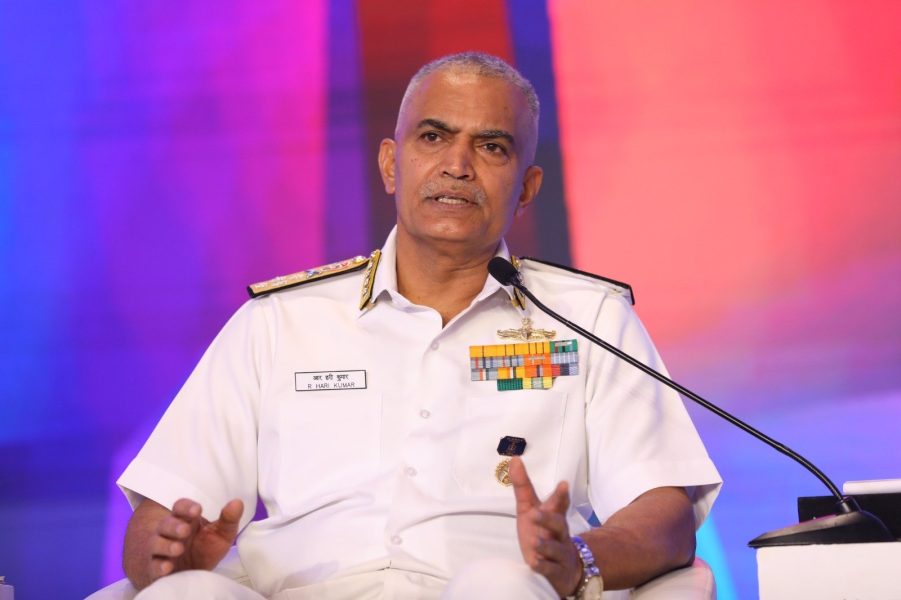
Raisina Dialogue: Navy chief highlights advantages of 'regional solutions to regional problems'

Navy chief Admiral R Hari Kumar on Saturday (March 4) stressed that contemporary challenges in the maritime domain could be best addressed by “issue-based convergences” among like-minded countries, while highlighting the advantages of “regional solutions to regional problems”.
The Chief of Navy Staff, citing India’s experience, said working in smaller groups and regional frameworks is helpful in building trust, interoperability and overall outcome.
Admiral R Hari Kumar was speaking at the Raisina Dialogue alongside Commander of the US Indo-Pacific Command Admiral John Aquilino, the UK’s chief of Naval Staff Admiral Ben Key and Chief of Staff of Japans defence ministry Gen Koji Yamazaki.
Also read: Indian Navy aims to become Atmanirbhar by 2047: Admiral Hari Kumar
Admiral Kumar said India’s policy in the region is based on the principles of respect, dialogue, peace and prosperity and it is guided by Prime Minister Narendra Modi’s vision of SAGAR or security and growth for all in the region.
To a question on the Indian perspective on working with partner countries to deal with challenges in the maritime domain, Kumar said they are both “non-traditional and trans-national” and cannot be addressed by any individual nation.
“There is a need for cooperation.. that is something we in the maritime domain always look forward to – to find how to cooperate, how to work together,” he said.
Also read: Explained: Why commissioning INS Vagir submarine is crucial for India
“While doing this, I would say today we are looking at issue-based convergences. We may not agree on certain things, but we will agree on many other issues. Therefore, we come together on those matters,” he added.
“We are looking at regional solutions to regional problems,” he said
Admiral Kumar also referred to the US Navy back in 2015 talking about a thousand-ship Navy including all the friendly partner navies coming together.
Gen Angus Campbell @CDF_Aust met Adm R Hari Kumar #CNS on the sidelines of #RaisinaDialogue. The interactions covered contemporary maritime issues, challenges in #IndoPacific & discussions on new avenues for enhancing operational cooperation b/n #IndianNavy & @Australian_Navy. pic.twitter.com/OK6l5OWEdF
— SpokespersonNavy (@indiannavy) March 4, 2023
The Navy chief also cited the advantages of regional groupings like the Indian Ocean Naval Symposium (IONS), which has 25 partner countries, the Colombo Security Conclave and the Goa Maritime Conclave.
“When we work in smaller groups, it serves a lot of purposes. For example, it generates a lot of trust among the partner countries; you work towards building capacity and it results in increasing interoperability, domain awareness and regular engagements. And all this finally leads to maritime security,” he said.
“There is a saying that rising tide lifts all boats. So therefore we look at prospering together. India is a country that looks at everybody in the region prospering together,” he said.
The Navy chief said technological innovations including space-based surveillance, artificial intelligence and electronic intelligence are helping maritime commanders to have better maritime domain awareness.
At the same time, he said the Ukraine war has shown the rapidity with which counter-measures are developed for all new technologies.
“There has been a lot of technological innovation that has been happening. We saw it in the Ukraine war as well,” he said.
VAdm Angus Topshee, @Comd_RCN met Adm R Hari Kumar, #CNS on the sidelines of #RaisinaDialogue.
Exchanged views on maritime engagements, ways to enhance Navy to Navy interactions & discussed defence industry cooperation & collaboration to support #MakeinIndia vision.@RoyalCanNavy pic.twitter.com/pPsapzgHGy— SpokespersonNavy (@indiannavy) March 4, 2023
Admiral Kumar said significant developments have taken place in areas of space-based surveillance and maritime domain awareness.
Transparency at the ocean is difficult due to its large space and to cover the entire spectrum of ocean would require a large number of assets and is cost-intensive, Kumar said.
“There is a need to harness the technology that is available for it,” he said.
In his remarks, Gen Koji Yamazaki said cyberspace and outer space are two important domains where “our adversaries are very active”.
“Japan is working towards building comprehensive defence capabilities to become secure and resilient in this regard,” he said.
Admiral Aquilino said that the benefit of AI in the short term is decision-making in real-time.
At the same time, he said that it is important not to lose sight that the military has a human dimension and interaction.
(With agency inputs)


